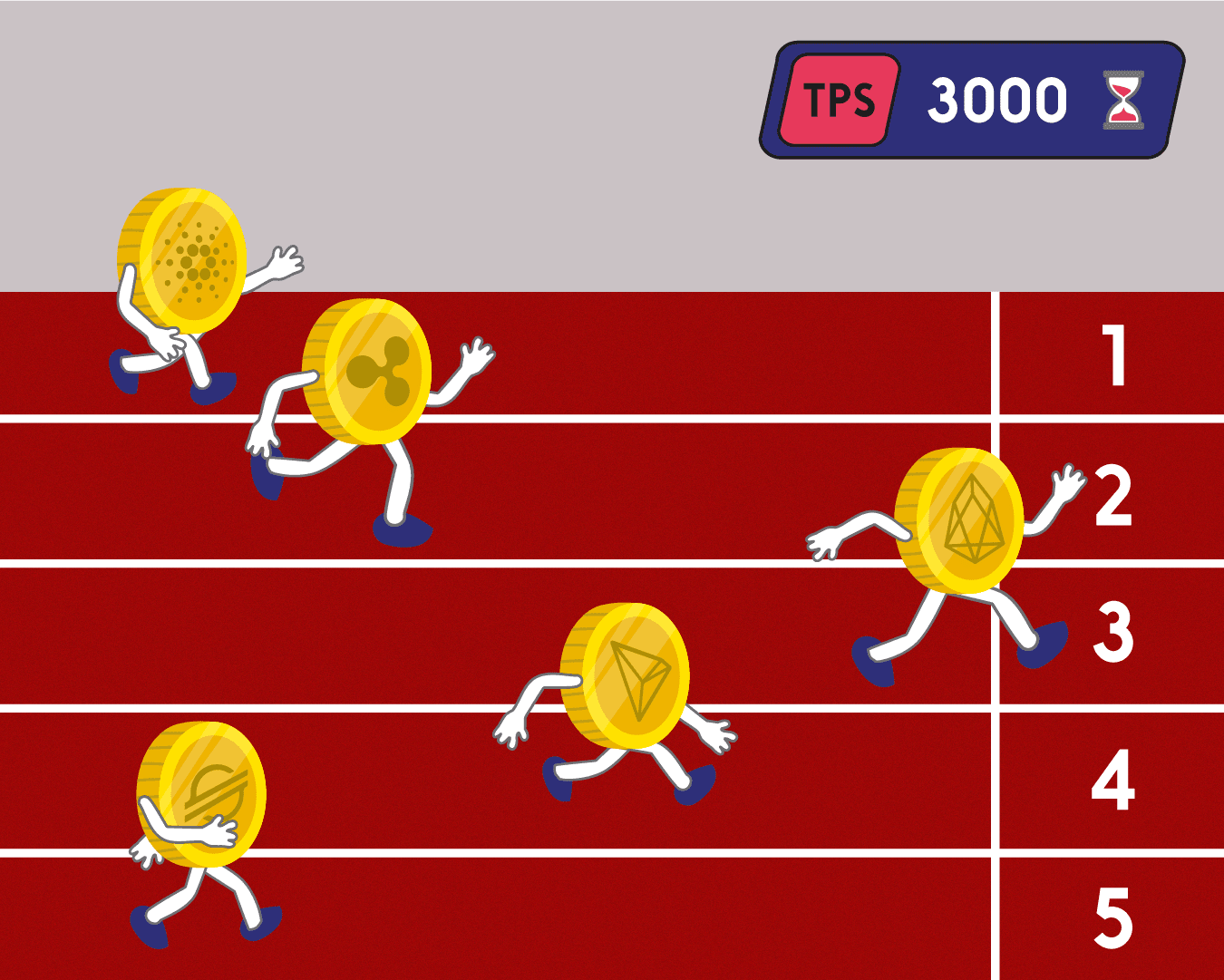When talking about cryptocurrencies transaction time, we’re referring to the amount of time it takes for a network to verify and execute a transaction. When it comes to timing, no two cryptocurrencies are the same. While one might be faster, the other might offer better rates. Join us in comparing cryptocurrencies transaction times and see which network best suits your needs, and your time frame. Before we start, let’s take a look at the entire crypto market versus the fiat market.
Fiat vs Crypto Transactions
Starting at the very beginning, let’s take a look at the advantages and disadvantages of the modern payment system vs the old one. Firstly, crypto transactions are sent from one electronic to another, while fiat uses banknotes or bank accounts. While fiat transactions can be refunded, they are often susceptible to high fees generated by all the merchants making the transaction happen. Crypto transactions on the other hand are entirely irreversible and their fees dynamic, as the fee structure is based on how busy the network is at the time. And lastly, crypto payments are designed to be peer to peer, requiring no need for a third party or intermediary. Fiat payments on the other hand, when swiping your card at least, often go through three to four parties.
Did you know that Visa transactions usually go through four parties before the transaction is cleared? First the individual cardholder makes the transaction, then the cardholder’s bank confirms that the funds are available and that the transaction can be executed. The merchant’s financial institution then enables the transaction, and lastly the funds arrive in the merchant’s account.
Not exactly the fastest process, hence why many banks are now adopting Ripple’s protocol, enabling funds to be transacted at a fraction of the speed and cost. Not to mention skipping international borders and forex rates.
The International Transaction Conundrum
A big speed bump in the process of international transactions for banks is the need for additional parties to be involved in a transaction, and the number of times the funds need to be changed into another currency. For instance, if you were to send funds from Japan to Kenya, it’s unlikely that either party will have the other one’s currency, therefore the transaction will need to change from yen to US dollars and then to Kenyan shillings. Each process will incur separate fees and forex charges, increasing not only the cost but the time it takes too.
Typically, an international bank transfer can take five days, while domestic transactions might take 24 hours – provided there are no banking holidays, etc. Blockchain however has no down time and transactions are typically completed in a matter of hours, if not minutes. The technology behind cryptocurrencies is also built in a way that there is constant research being done on innovative ways to increase the time spent and the costs incurred. Traditional fiat systems can’t necessarily compete here as the technology behind them is limited and outdated.
Comparing Cryptocurrencies Transaction Times
Let’s dive into the top 5 fastest cryptocurrencies based on transaction times. According to Coinmarketcap, there are over 7,500 cryptocurrencies on the market, and while Bitcoin might be number one, it is by no means the fastest.
5. Cardono
The first contender on our list of comparing cryptocurrencies transaction times is Cardano, a decentralized smart contract platform fueled by ADA. The Proof of Stake (PoS) network works on scalability issues and can handle an impressive 1,000 transactions per second.
4. Stellar Lumens
Often compared to PayPal and other such platforms, Stellar Lumens offer a cheaper, faster, and more secure digital payments ecosystem. XLM transaction time sits at 1,000 TPS, higher than any other e-commerce platform in question.
3. Ripple
Bridging the gap between traditional payment systems and blockchain, Ripple provides a seamless service to banks while using the powers of blockchain technology. Ripple’s transaction time is 1,700 TPS.
2. Tron
Coming in with the ability to process 2,000 transactions per second, Tron is a top contender in the fastest transaction times. Similar to Ethereum, Tron provides a platform on which developers can build dApps and smart contracts, particularly focused on the entertainment industry.
1. EOS
EOS might be just outside of the top 10 list of biggest cryptocurrencies but it is certainly the fastest. The network can process transactions at around 3,000 TPS, the fastest among all the other cryptocurrencies. Better yet, the network is also focused on eliminating transactions fees and promoting scalability.
Fast Transactions, Fast Money
Cryptocurrencies are empowering the world with a faster, cheaper, and more secure method of sending money, both domestically and internationally. With these impressive processing times, users can be assured that the networks are capable of executing a number of operations at once. When comparing cryptocurrencies' transaction times, not only are they far more impressive than fiat options, but also entirely impressive in their own rights. Tap into Oobit to seamlessly transition between fiat and crypto today.
_________________________________________________________
Oobit Technologies Pte, 50 Raffles Place #37-00 Singapore Land Tower, Singapore (048623). is a company registered in Singapore (no:201716443G), that has been approved as Appointed Representative of Oobit Technologies OÜ, Harju maakond, Tallinn, Lasnamäe linnaosa, Väike-Paala tn 2, 11415, (no: 14852617 ). Which is authorized and regulated by the FIU (no: FVR001421 and FRK001304).

